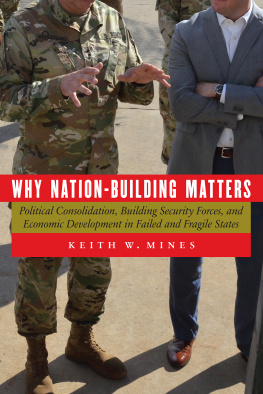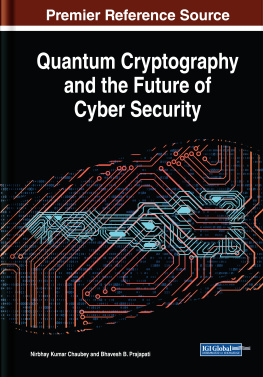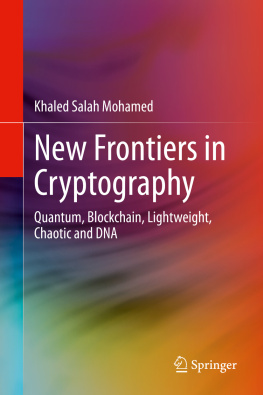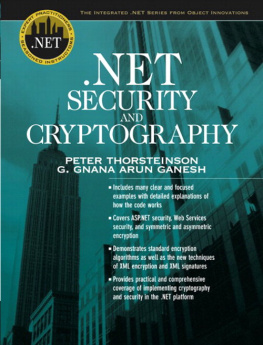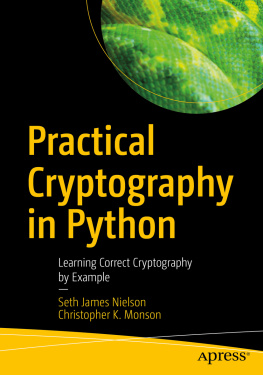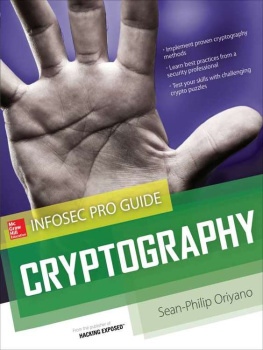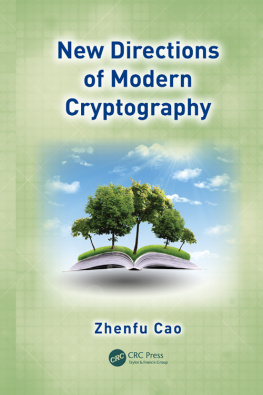Keith Martin - Cryptography: The Key to Digital Security, How It Works, and Why It Matters
Here you can read online Keith Martin - Cryptography: The Key to Digital Security, How It Works, and Why It Matters full text of the book (entire story) in english for free. Download pdf and epub, get meaning, cover and reviews about this ebook. year: 2020, publisher: W. W. Norton & Company, genre: Religion. Description of the work, (preface) as well as reviews are available. Best literature library LitArk.com created for fans of good reading and offers a wide selection of genres:
Romance novel
Science fiction
Adventure
Detective
Science
History
Home and family
Prose
Art
Politics
Computer
Non-fiction
Religion
Business
Children
Humor
Choose a favorite category and find really read worthwhile books. Enjoy immersion in the world of imagination, feel the emotions of the characters or learn something new for yourself, make an fascinating discovery.

- Book:Cryptography: The Key to Digital Security, How It Works, and Why It Matters
- Author:
- Publisher:W. W. Norton & Company
- Genre:
- Year:2020
- Rating:3 / 5
- Favourites:Add to favourites
- Your mark:
- 60
- 1
- 2
- 3
- 4
- 5
Cryptography: The Key to Digital Security, How It Works, and Why It Matters: summary, description and annotation
We offer to read an annotation, description, summary or preface (depends on what the author of the book "Cryptography: The Key to Digital Security, How It Works, and Why It Matters" wrote himself). If you haven't found the necessary information about the book — write in the comments, we will try to find it.
Keith Martin: author's other books
Who wrote Cryptography: The Key to Digital Security, How It Works, and Why It Matters? Find out the surname, the name of the author of the book and a list of all author's works by series.
Cryptography: The Key to Digital Security, How It Works, and Why It Matters — read online for free the complete book (whole text) full work
Below is the text of the book, divided by pages. System saving the place of the last page read, allows you to conveniently read the book "Cryptography: The Key to Digital Security, How It Works, and Why It Matters" online for free, without having to search again every time where you left off. Put a bookmark, and you can go to the page where you finished reading at any time.
Font size:
Interval:
Bookmark:
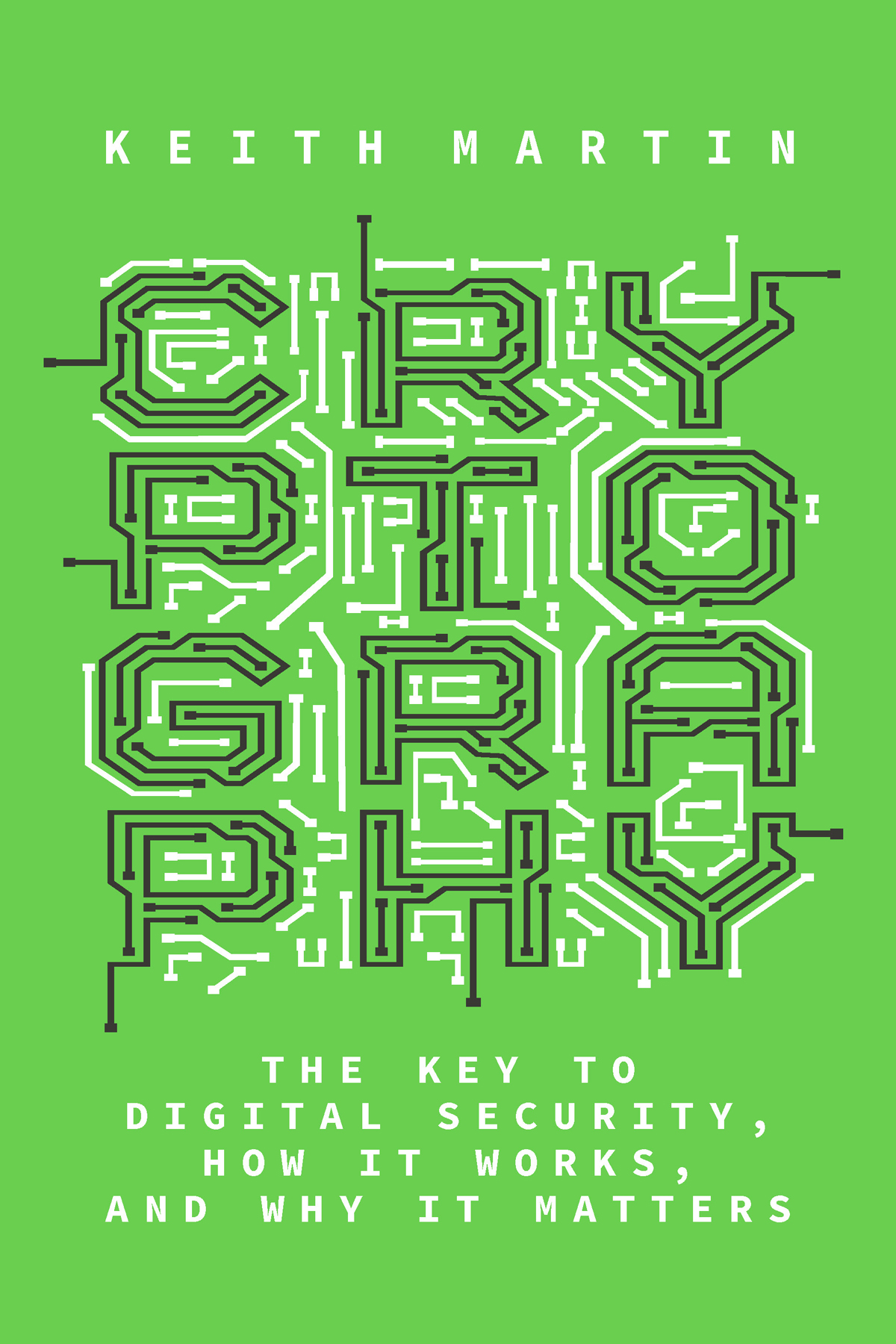
ALSO BY KEITH MARTIN
Everyday Cryptography:
Fundamental Principles and Applications
The Key to
Digital Security,
How It Works, and
Why It Matters
KEITH MARTIN

To Fred: cryptographer, visionary, mentor
CRYPTOGRAPHY
J ulius Caesar used it. Mary, Queen of Scots, also used it, but lost her head as a result. Napoleon misused it, costing himself an empire. During the Second World War, all sides relied on it, with Allied superiority in mastering it widely credited for shortening the duration of the conflict. Spies deployed it throughout the Cold War, and still do. Yet there is someone who uses it more often, for a far greater diversity of purposes. Someone who completely depends on it for much, if not most, of their daily activity. That person is you. And this vital tool is cryptography.
You use cryptography to secure a host of everyday tasks. You use it when you make a mobile phone call, withdraw cash from an ATM, connect to a Wi-Fi network, log in to a computing device, search for information on Google, and watch movies using a service such as Netflix. Cryptography helps to secure more than a billion Apple devices, The Bitcoin digital-currency scheme and its associated blockchain are built entirely from cryptography.
Cryptography also protects over three-quarters of all global connections made to the World Wide Web. Did you know that when your web browser connects to a secure website, you are using cryptographic tools that helped to drive a computing revolution that led to the development of the internet we know today? Did you know that each time you open your car door, your car key fob is doing something beyond the capabilities of an attacker with access to the worlds most powerful supercomputer? Were you aware that messages sent from your phone are often protected by cryptography so strong that it worries some governments and intelligence agencies?
Cryptography is, essentially, an application of mathematics. However, few applications of mathematics have achieved the profile, social importanceeven notorietyof cryptography. Most of the time, mathematics does not provide a focus for blockbuster moviesbut in the case of cryptography, it has inspired such films as Enigma, Skyfall, and Sneakers; Nor does mathematics normally end wars or disturb world leaders.
What cryptography does is to provide a set of tools that can be used to protect information. Although it can be applied to information represented in physical space, such as words written on a page, it is our increasing reliance on digital information that has made cryptography so essential to our everyday lives. Cryptography enables us to keep sensitive information secret. It can detect when information has been accidentally, or deliberately, modified. It allows us to determine who we are communicating with. In fact, to establish the basic elements of digital security, cryptography is pretty much the only game in town.
Cryptography is like antibiotics. You can get through your life by taking antibiotics without any real understanding of them. Yet there are two important reasons for knowing what they do and how they work. First, the knowledge improves your understanding of human health, as well as helps you decide when to take antibiotics, for the good of both yourself and others. Second, our individual use of antibiotics raises important issues for the wider society, including concerns about overuse and the rise of superbugs.
Similarly, you can breeze through your life using cryptography without even being aware of it. However, I am convinced that a little bit of knowledge about cryptography can make a big difference to your life. First and foremost, I want to open your eyes to the critical role that cryptography plays in supporting your everyday life. By learning what cryptography does and how it works, I believe, you will acquire greater confidence in reasoning about your own personal digital security. Use of cryptography also raises wider social questions about how society should balance personal freedom with control of information, which I will also explore in this book.
Cyberspace
I will not make any significant attempt to define what cyberspace is
Cyberspace consists of computers communicating with other computers across networks. These computers include things clearly recognizable as computers, such as laptops. They also include gadgets such as mobile phones, gaming consoles, and voice assistants, which we mostly recognize as devices capable of accessing the internet yet do not always regard as computers.
Cyberspace also consists of millions of computers we directly interact with, such as sales terminals, automatic teller machines, and passport control gates, and many we dont, such as computers that support business, defense, and industrial control systems. Perhaps most importantly, and to an extent alarmingly, many everyday devices that traditionally we dont think of as having a digital element, let alone as being computers, are rapidly becoming devices in cyberspace. These include cars, homes, and domestic appliances. The networks connecting all these devices in cyberspace can be wired or wireless, short- or long-range, open to all or dedicated to specific purposes such as telecommunications. By far the most significant of these networks is the internet.
Of course, cyberspace and the physical world are not entirely different concepts. Aspects of the physical world increasingly interact with cyberspace. It is generally becoming hard to find people who do not use the internet, businesses without an online presence, or technologies not interacting with cyberspace in some way. And most things that happen in cyberspace occur because human beings press buttons on physical devices that execute instructions on machines in physical places.
Your Security in Cyberspace
Just for a moment, reflect on how much you depend on cyberspace. Consider how you communicate with your friends, where you get your news, and how you research your next vacation. Think about how you manage your money and how you pay for things. Dont forget how you access music, movies, and personal photographs. Did you remember to include your car? It opens its doors at the click of a button, always knows exactly where it is, reports its problems to the manufacturer, and in the future it will undoubtedly drive itself. And this is just the tip of the iceberg. Theres all the invisible stuff you rely on every day that just seems to happen. Planes fly, electricity powers, and traffic lights change. These days, almost everything relies on cyberspace.
Because we increasingly live our lives in cyberspace, so, too, do criminals. Cyberspace is a wonderful place to commit crime. Freed from the tyranny of distance, cyberspace enables criminals from anywhere in the world to raid your home. Its a place of smoke and mirrors, where a teenager in a bedroom can pretend to be your bank or build a website resembling that of a major department store. Hence the endless stories in the media about security incidents involving computersand these are just the ones we hear about.
Exact figures are notoriously hard to establish, but cybersecurity firm Norton claims there were 978 million global victims of cybercrime in 2017 (altogether losing $172 billion),
We are physical beings who have evolved in a physical world in which we have a reasonable understanding of what security means (locked doors, passport controls, signed documents, etc.). However, we appear to lack the equivalent common sense to operate safely in cyberspace. The invisibility of cyberspace doesnt help, but I suspect our main lack of intuition comes from a failure to understand even the basics of what security in cyberspace might mean. As a result, were all capable of doing daft things in cyberspace. We leave our front doors wide open, we hand over our bank account details to strangers, and we etch highly personal messages into tablets of digital stone that will remain legible forever. I will show you how cryptography attempts to address the heart of the problem of securing cyberspace and, as a result, will equip you with an ability to make much better judgments about your own cybersecurity.
Font size:
Interval:
Bookmark:
Similar books «Cryptography: The Key to Digital Security, How It Works, and Why It Matters»
Look at similar books to Cryptography: The Key to Digital Security, How It Works, and Why It Matters. We have selected literature similar in name and meaning in the hope of providing readers with more options to find new, interesting, not yet read works.
Discussion, reviews of the book Cryptography: The Key to Digital Security, How It Works, and Why It Matters and just readers' own opinions. Leave your comments, write what you think about the work, its meaning or the main characters. Specify what exactly you liked and what you didn't like, and why you think so.

